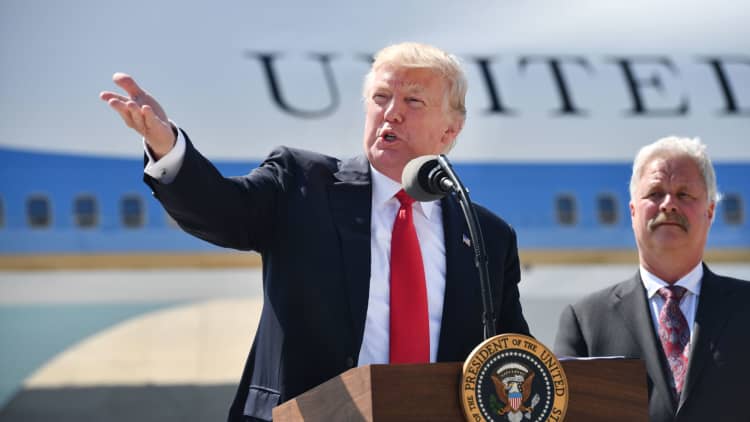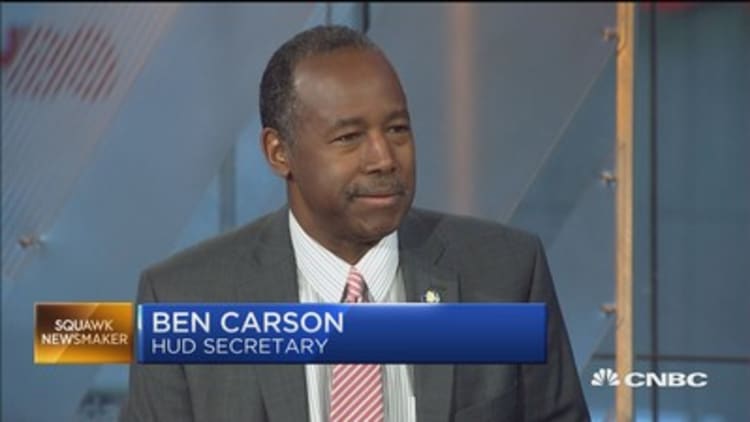
A new government analysis finds that the House's Obamacare replacement bill would lead to 10 million fewer people lacking health insurance in the next decade than had been estimated by the Congressional Budget Office — but also projects higher premiums for many customers of individual health plans.
The report was issued Tuesday, shortly after President Donald Trump reportedly told a group of 13 Republican senators that the House bill passed last month by the GOP majority was "mean," and that the version being drafted in the Senate should be "more generous."
The report from the Office of the Chief Actuary of the federal Centers for Medicare and Medicaid Services says that by 2026 there would be 13 million more Americans without health insurance if it becomes law.
In contrast, the CBO estimated in its own report that 23 million more people would become uninsured by 2026 if the House's American Health Care Act is signed into law.
Paul Spitalnic, chief actuary of CMS, the agency that oversees Obamacare, also projected that fewer people would become uninsured next year, the first year the AHCA would take effect.
"In 2018, the number of uninsured is estimated to be about 4 million higher under the AHCA than under the current law, mainly due to the impact of repealing the individual mandate," which requires most Americans to have some form of health coverage, wrote Spitalnic.
CBO had estimated that 14 million more people would become uninsured next year if the Republican bill becomes law — 10 million more than estimated by the actuary for next year.
Both CMS and CBO estimated how many more people would lack health insurance than would be the case if Obamacare remained intact.
If Obamacare stays the law as is, an estimated 28 million people would be uninsured by 2026. In the actuary's report, a total of 41 million would be uninsured by that year if the AHCA is passed. CBO estimated the total will be 51 million.

Obamacare has been credited with expanding coverage to 20 million Americans in past several years. The House bill would remove the requirement that most people have some form of insurance or pay a fine, and reduce the amount of money the federal government spends on subsidies for insurance plans and Medicaid.
The CMS actuary estimated that in the individual insurance plan market, "average gross premiums are estimated to be roughly 13 percent lower in 2026 under the AHCA than under current law."
But, he added, average net premiums, or the monthly cost of the insurance after government subsidies to customers are factored in, "are roughly 5 percent higher than under current law."
And the average amount of money customers would be liable to personally pay out of pocket for health services or prescriptions they receive are projected to be about 61 percent higher under the AHCA than if Obamacare remained in place.
CBO's estimate of the AHCA's effect on premiums did not factor in subsidies. But it was more complicated than the actuary's estimate because it calculated the effects of whether a state did or did not request waivers from Obamacare rules requiring insurers to not charge sicker customers higher premiums, and from rules requiring insurers to offer customers a certain minimum set of benefits.
In some states that did not request waivers, CBO said, premiums would be about 4 percent lower than they would be if Obamacare stayed the law of the land. In other states that made moderate changes to regulations, average premiums would be about 20 percent lower than current laws.
And premiums would be even lower in other states that were aggressive in obtaining waivers, but "less healthy people would face extremely high premiums," CBO said.
Elsewhere in his new report, CMS's actuary estimated there would be an increase of direct out-of-pocket health spending by households of almost $221 billion under the AHCA. That increase in spending will be "almost entirely offset by lower spending because of declines in employer-sponsored coverage, a reduction in the additional Medicare tax for high-income earners, and the effect of the elimination of the health insurance tax on premiums" under the bill.
Nicole Gill, executive director of the advocacy group Tax March, said, "The Trump Administration's own Centers for Medicare and Medicaid Services released a report today proving that the American Health Care Act would be a disaster for American families as it increases their out-of-pocket health care costs by an astounding $221 billion over the next ten years."
"That is a stunning jump in cost-sharing that will be a heavy burden for American families, all to pay for tax cuts for the rich," Gill said. "This report proves one thing: This bill literally takes money out of the pockets of working families to pad the wallets of millionaires and billionaires."
Also Tuesday, Trump traveled to Milwaukee, Wisconsin, where he blasted Obamacare and Democrats whom he accused of obstructing his efforts and those of congressional Republicans to fix the health insurance system.
Trump called Obamacare "a catastrophe," and said "millions of Americans, and I mean millions, continue to suffer" from the program.
The president said many people have been saddled with ever-increasing insurance premiums, and have had to deal with insurers abandoning markets.
But, he added, "the Senate is getting ready to do something."
Despite that promise, and despite GOP control of both chambers of Congress, both Trump and Congressional Republicans have found it is taking longer than they had hoped to achieve that goal.
The House bill passed that chamber by a margin of just a single vote in May.
Since then, a group of GOP senators have been meeting, without any Democratic colleagues in attendance, to discuss the framework of their own Obamacare replacement bill.
The secrecy of their discussions, and the refusal to date by GOP leader to publicly release details of their bill, has drawn scorn from Democrats.
Leslie Dach, director of the Obamacare advocacy group Protect Our Care Campaign, cited the Associated Press's report that said Trump had told GOP senators on Tuesday that the House bill was "mean," and that the Senate's version should be "more generous."
"President Trump now believes the House Republican health care is too mean because it hurts people — we agree," Dach said. "The problem is that the Senate's secret health care repeal plan does almost all the same things. It's no wonder they don't want anyone to see it."
The Democratic National Committee on Tuesday pointed to a new survey from Public Policy Polling, which said "health care continues to be a political disaster for Republicans."
"Only 24 percent of voters support the American Health Care Act to 55 percent who oppose it," PPP said. "It doesn't even have majority support among GOP voters — 42 percent support it to 29 percent who are opposed. Voters prefer the current Affordable Care Act to the alternative of the AHCA by a 51/34 spread, and only 35 percent of voters think the best path forward on health care is to repeal the ACA while 59 percent think it should be left in place with fixes made to it as necessary."
The Democratic National Committee said, "Trump's health care repeal bill remains incredibly unpopular. With these abysmal numbers, it is no wonder that Senate Republicans are trying to pass this bill in secret, with no hearings and without the public even being able to see the text."
Senate Majority Leader Mitch McConnell, (R-Ky.), on Tuesday declined to say when details of the bill would be released, or when he expected that a vote on it would be held.
Earlier Tuesday, CMS released a map highlighting counties in the United States that are projected to either have just one insurer selling Obamacare plans next year, or no insurer selling such individual health plans.
As many as 1,200 counties, or almost 40 percent of all U.S. counties nationwide, containing 2.4 million customers of Obamacare exchanges, are projected to have just one insurer next year.
Another 47 counties strewn across Ohio, western Missouri and Washington are currently projected to have no insurer selling individual plans in 2018. At least 35,000 current customers of the government-run insurance exchanges live in those so-called bare counties.
"This is yet another failing report card for the [Obamacare] exchanges," said CMS Administrator Seema Verma. "The American people have fewer insurance choices and in some counties no choice at all."
Watch: Carson on health care & housing



